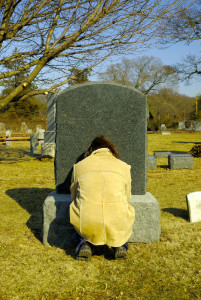“Grief can only be described as a time of craziness when all the rules that govern life are suspended, when coping mechanisms that used to work no longer do, when the foundation and rhythm of your days are shattered into an unrecognizable crazy-quilt”[1]. Those of us who have experienced significant loss understand this “crazy quilt”. One minute we may feel hopeful and steady and the next we’re blown over by the pain of sorrow and separation.
What is Grief?
 Grief is the body, mind, and spirit’s natural response to loss. Though most of the focus of grief is on death (or the loss of life) loss comes in many forms—from illness to job loss to infertility to pet loss to moving, loss affects us all at some time or another, and we are made to react to all forms of loss in one way or another (more on Understanding Loss).
Grief is the body, mind, and spirit’s natural response to loss. Though most of the focus of grief is on death (or the loss of life) loss comes in many forms—from illness to job loss to infertility to pet loss to moving, loss affects us all at some time or another, and we are made to react to all forms of loss in one way or another (more on Understanding Loss).
Grief Symptoms
Each person’s grief is made up of a unique blend of symptoms. This can make many of us feel “crazy,” especially if we are experiencing symptoms others don’t seem to be experiencing, and can make dealing with grief a challenge to family and other close relationships.
There are literally over a hundred possible symptoms of grief—far too many to list here. However, some of the more common symptoms include:
- sadness, sobbing, anger, guilt, anxiety, loneliness, fear, and numbness
Grief can also impact the mind, leading to:
- confusion, inability to concentrate, and poor attention, planning, problem-solving, and memory
Grief often shows up in highly physical ways too:
- fatigue, low energy, changes in appetite, tightness in chest/throat, stomach aches, nausea, headaches, or other somatic symptoms
Grief may also include experiences that seem like hallucinations; hearing or seeing the deceased is common in the first months after loss.
Grieving Styles
There are almost as many styles of expressing grief as there are symptoms. Grief affects each person uniquely—whereas one may express anger, another may be sad and tearful, while still another may be distant and numb. This can be particularly tough for families, where each family member has a different experience of the very same loss.
Couples can have an especially hard time understanding one another’s grief process, with one partner wishing to talk about the loss over and over and the other wishing to just forget about it. In the words of Anne Morrow Lindbergh, “He learned about the isolation of grief, even for those in the same grief. Grief can’t be shared. Everyone carries it alone, his own burden, his own way” (Dearly Beloved). This is, perhaps why dealing with grief can seem so isolating—it can feel as if no one understands the burden we bear. Yet, couples and families who find a way to deal with grief together have healthier outcomes. Turning toward each other in times of grief is key to keeping relationships solid and strong.
“Normal” vs. “Abnormal” Grief
Many of us wonder, in times of grief and loss, “Is this normal?” For the most part, the answer is “Yes.” “Normal” grief encompasses a wide range of reactions and should also take into account religious and cultural norms. The nature of the loss also plays a role in grief,  with sudden, traumatic deaths and losses typically leading to a more complex and challenging grief experience. Murder and suicide are especially difficult to grieve, as are losses that carry a social stigma, like drug abuse or other antisocial acts resulting in loss.
with sudden, traumatic deaths and losses typically leading to a more complex and challenging grief experience. Murder and suicide are especially difficult to grieve, as are losses that carry a social stigma, like drug abuse or other antisocial acts resulting in loss.
Grief becomes “abnormal” when it fails to progress through the grief process. This is called Complicated Grief and may involve:
- A failure to work through the 5 Stages of Grief, or grief tasks.
- A grief response that is severely delayed, masked by a psychological or physical problem, or exaggerated into clinical depression or anxiety.
- Or grief that becomes chronic, with the bereaved getting “stuck” in the mourning process and failing to progress. Sometimes this can last for years.
Dealing (& Healing) with Grief
I guess you could say the only predictable thing about grief is that, sooner or later, we all will grieve. How that occurs, is a unique mystery; it is our own process—unpredictable until it is upon us. But, the sooner we acknowledge our grief and work through the symptoms, the better our healing prognosis will be. As one author wisely stated, “These symptoms may come and go and last far longer than we wish they would, especially if we don’t acknowledge and work through them.”
In cases of complicated grief, counseling and professional support is recommended. Sometimes all we need is someone who can guide us through grief, showing us the way and helping us understand that grief is an expression of love that needs to be expressed in order to heal. Counseling or grief support groups are helpful in cases of normal grief too—having someone there who understands what we’re going through, who can see what we cannot, and who can take on the emotions we need to release is a wonderfully healing process.
It’s Not Easy, but It’s Worth It
Yes, dealing with grief is not easy. As one grief expert has stated, “Mourning is one of the developmental tasks in life for which we are singularly unprepared. We are unlikely to apply for a job for which we are totally untrained…. No one would buy a widget that didn’t come with instructions. But where do you find role models for mourning? Who rehearses for this drama?” Yes, we all grieve and we all need guidance, direction and tools to help us deal with grief. But, it’s worth it. It may take time, love, and more patience than we thought possible, but when we deal with our grief, we heal.
Article by: Dr. Christina Hibbert
Related Articles:
“How do I Grieve?”: Grief Work & TEARS
The Do’s & Don’ts of Helping Others Through Grief
In Memory of My Sister, on the 5th Anniversary of Her Death
Weather the Storms Together: 4 Ways to Strengthen Families through Times of Stress
Parents & Grief (coming soon!)
Children & Grief: What You Need to Know
Children & Grief: What You Can Do
Siblings & Grief: 10 Things Everyone Should Know
Couples & Grief (coming soon!)
Grief Support
Resources:
[1] Bernstein, J.R. (1997). When the Bough Breaks: Forever after the death of a son or daughter. Kansas City, MO: Andrews McMeel Publishing, p.5.
Walsh-Burke, K. (2006). Grief and Loss: Theories and Skills for Helping Professionals. Boston, MA: Pearson Education, Inc.
